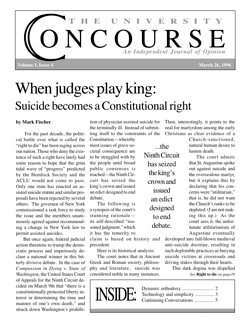St. Thomas and Catholic connaturality
by Michael Waldstein
The debate being carried on in the Concourse about the role of St. Thomas in a Catholic university is fascinating. Excellent points, it seems to me, are being made on both sides. As the debate goes back and forth about the precise meaning of the Church’s teaching on St. Thomas, an immediate practical point should not be overlooked. However one interprets the Church’s teaching, one thing is abundantly clear and beyond dispute, namely, that St. Thomas should be read, and read extensively. He ought to be a dear and beloved teacher to whom one turns, and turns frequently. As a graduate of the Phenomenological Ph.D. program guided by Josef Seifert, as a biblical scholar and as a theologian devoted particularly to Hans Urs von Balthasar, I have been formed in many ways that do not directly derive from St. Thomas. Yet it is without any doubt my duty, and a joyful duty (analogous to the duty to be open to life in marriage), to study St. Thomas.
St. Thomas may appear on occasion dry and forbidding, but beneath everything he writes there is a deep and living twofold source, namely, the wisdom which is the fruit of extraordinary intelligence and study and the wisdom which is a gift of the Holy Spirit. He himself describes this double fountain of wisdom wonderfully:
“...wisdom denotes a certain rightness of judgment in accord with divine principles. Now rightness of judgment is twofold: first, in accord with the complete use of reason, second, on account of a certain connaturality with the matter about which one has to judge. Thus, about matters of chastity, a man after inquiring with his reason forms a right judgment, if he has acquired the knowledge of ethics, while the one who has the virtue of chastity judges of such matter by a kind of connaturality. Accordingly it belongs to the wisdom that is an intellectual virtue to pronounce right judgment about divine things after reason has made its inquiry, but it belongs to wisdom as a gift of the Holy Spirit to judge aright about them on account of connaturality with them. Thus Dionysius says (Div. Nom.ii), ‘The man of God is complete in divine things, not only by learning, but also by suffering divine things (patiens divina).’ Suffering with God and connaturality with God (compassio et connaturalitas) is the result of charity, which unites us to God, according to 1 Cor.6:17: Anyone united to the Lord becomes one Spirit with him. Consequently wisdom which is a gift, has its cause in the will, which cause is charity, but it has its essence in the intellect, whose act is to judge aright, as stated above.” (Summa Theol., II-II, q.45, a.2).
To turn to a teacher who is a fount of wisdom of both kinds and who is recommended by the Church for this very reason—who would refuse such an invitation? Who would refuse to embrace such a teacher? What Catholic university would not give him a prominent place in its core curriculum? If being a “Thomist” means loving St. Thomas and embracing him as a teacher, to become connatural with him, then, whether I call myself a Phenomenologist or a Balthasarian, I want to be a Thomist as well. I want to be a Thomist because I want to “suffer with” and “be connatural with” Christ in the Catholic Church.
It may be helpful to make available for general scrutiny the following article: Santiago Ramirez, “The Authority of St. Thomas Aquinas,” Thomist 15 (1952) 1-109. Ramirez’s own conclusions from Papal texts are often debatable, but the article is very useful, because it conveniently assembles many of the relevant Papal texts, including texts not easily available otherwise, e.g., sections of a letter addressed by Leo XIII to the Minister General of the Friars Minor (Ramirez, p.59).
Michael Waldstein, Assistant Professor, Program of Liberal Studies, University of Notre Dame
Dr. Waldstein (a native of Austria) has recently accepted a position as President of the International Theology Institute in Gaming. He, his wife Susan and their six children will be moving there over the summer.


